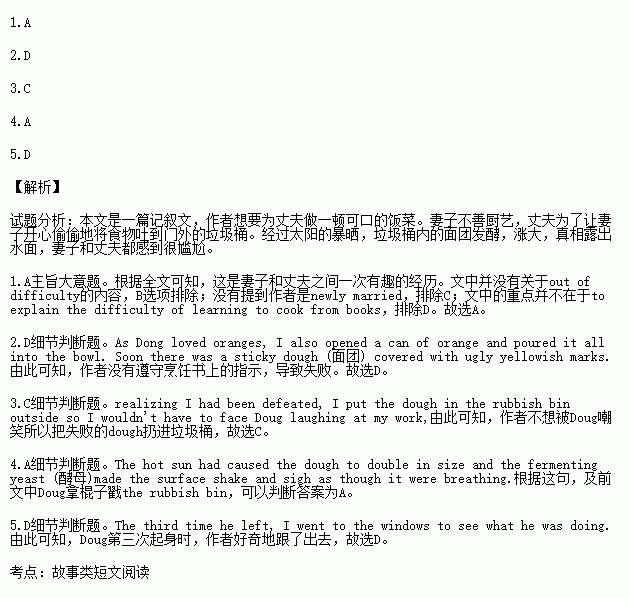题目内容
The easy way out isn't always easiest. I learned that lesson when I decided to treat Doug, my husband of one month, to a special meal. I glanced through my cookbook and chose a menu which included homemade bread. Knowing the bread would take time, I started on it as soon as Doug left for work. As I was not experienced in cooking, I thought if a dozen was good, two dozen would be better, so I doubled everything. As Dong loved oranges, I also opened a can of orange and poured it all into the bowl. Soon there was a sticky dough (面团) covered with ugly yellowish marks. realizing I had been defeated, I put the dough in the rubbish bin outside so I wouldn't have to face Doug laughing at my work, I went on preparing the rest of the meal, and, when Doug got home , we sat down to Cornish chicken with rice . He tried to enjoy the meal but seemed disturbed. Twice he got up and went outside, saying he thought he heard a noise. The third time he left, I went to the windows to see what he was doing. Looking out, I saw Doug standing about three feet from the rubbish bin, holding the lid up with a stick and looking into the container. When I came out of the house, he dropped the stick and explained that there was something alive in out rubbish bin . Picking up the stick again, he held the lid up enough for me to see. I felt cold. But I stepped closer and looked harder. Without doubt it was my work. The hot sun had caused the dough to double in size and the fermenting yeast (酵母)made the surface shake and sigh as though it were breathing. I had to admit what the 'living thing 'was and why it was there. I don't know who was more embarrassed(尴尬)by the whole thing Doug or me.
1. The writer's purpose in writing this story is ___________
A. to tell an interesting experience
B. to show the easiest way out of a difficulty
C. to describe the trouble facing a newly married woman
D. to explain the difficulty of learning to cook from books
2. Why did the woman's attempt at making the bread turn out to be unsuccessful?
A. The canned orange had gone bad.
B. She didn't use the right kind of flour.
C. The cookbook was hard to understand.
D. She did not follow the directions closely.
3.Why did the woman put the dough in the rubbish bin?
A. She didn't see the use of keeping it
B. She meant to joke with her husband.
C. She didn't want her husband to see it.
D. She hoped it would soon dry in the son.
4.What made the dough in the rubbish bin?
A. The rising and falling movement.
B. The strange-looking marks.
C. Its shape.
D. Its size.
5.When Doug went out the third time , the woman looked out of the window because she was ______________.
A. surprised at his being interested in the bin
B. afraid that he would discover her secret
C. unhappy that he didn't enjoy the meal
D. curious to know what disturbed him
 阅读快车系列答案
阅读快车系列答案假定你在参加一场英语辩论赛,你是正方辩手,试用英语简要地表明自己的观点。
主题 | Shall a senior school student take a part-time job in holidays? |
观点 | 1. 高中生重视功课,面对社会所知甚少。 |
2.假期做a part-time job是很好的社会实践。 | |
3. 假期是最好的补偿时间。 | |
3.通过书本学到的东西不如通过经验学到的东西有效。 | |
4.通过社会实践,我们可以在知识和能力两个方面取得进步。 | |
5.假期做a part-time job的报酬对家里或多或少有些帮助。 | |
结论 | 高中生…… |
注意:(社会实践:social practice; 社会:society ; 知识:knowledge )
1、 词数100左右;2、开头已为你写好。
Here are my points. _____________________________________________________________
_______________________________________________________________
_______________________________________________________________
_______________________________________________________________

